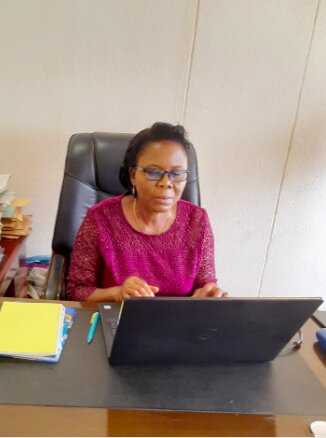International Woman’s Day Q&A with Dr Nebe Obiageli, Federal Ministry of Health, Nigeria

Dr Nebe Obiageli is the Coordinator of the National Deworming Programme at the Federal Ministry of Health in Nigeria. Dr Nebe serves as the secretary of the WASH sub-committee of the National NTD Steering Committee and has worked on NTDs in Nigeria for many years, with experience in tackling onchocerciasis, lymphatic filariasis, schistosomiasis and soil-transmitted helminths.
Dr Nebe’s contribution to NTDs has been significant. In particular, she has been a strong advocate for cross-sectoral collaboration between WASH and NTD stakeholders to accelerate progress towards elimination, to appropriately manage disease and to sustain gains made.
To commemorate International Women’s Day 2020, NNN WASH Working Group co-Chairs Yael Velleman and Leah Wohlgemuth spoke with Dr Nebe about her important work in Nigeria.
Why is collaboration on WASH and NTDs important in Nigeria?
For a long time, we have been addressing many of the NTDs through treatment with medicines. We have come to realise that using this approach alone, we will not be able to eliminate most NTDs in Nigeria. We observed that WASH is very critical in the prevention, control and elimination of these NTDs. Additionally, WASH strategies and interventions can also contribute to health systems strengthening and the achievement of universal health coverage.
What experience have you had using the NNN/WHO WASH & NTDs toolkit?
We started using the toolkit the moment it was launched. The first step was to undertake a ‘domestication’ process – contextualising the toolkit to Nigeria’s situation – together with all WASH and NTDs stakeholders. We found that the tools guide the programme in planning, rather than just intervention design; it also helps to build the right partnerships. All the WASH and NTDs partners were part of this process and now we are working on finalising this ‘domestic’ version and implementing activities, with support from Sightsavers under the Accelerate programme. We have already undertaken the situation analysis step of the toolkit, shared it with stakeholders, and began implementation two sites in Northern Nigeria. We hope to scale up our efforts to the rest of the country. This collaboration is based on the understanding that it will help all stakeholders achieve their goals and objectives.
What are the next steps in terms of WASH and NTD coordination in Nigeria?
Once we finalise our context-specific resources and tools, we need to scale up. The issue of indicators is particularly important; we had a workshop in which we agreed on the key WASH and NTDs indicators, which we aim to harmonise within the WASH Management Information System and the WASH National Routine Monitoring – both of which are managed by the Ministry of Water Resources. We’re also discussing the opportunity of collection of NTD data through the WASH monitoring system and engaging with the Ministry of Water’s initiative to implement the national framework to end open defecation in Nigeria.
What has contributed to success in Nigeria?
The ongoing coordination between the Federal Ministry of Health and a very vibrant and active NGO group, as well as our collaboration with the Ministry of Water Resources, have been very important. We also have several platforms that enable this collaboration, such as the interministerial dialogue on sanitation, the WASH sub-committee of the NTDs Steering Group, and various other coordination platforms.
How did you build such a strong relationship with the Ministry of Water Resources?
This started with the launch of the WHO Global Strategy on WASH and NTDs in 2015. As soon as this happened, the national NTD coordinator was able to convene the first meeting with the WASH stakeholders and established the sub-committee. Including many different agencies in the steering committee increased the interaction. We were able to highlight the need for integration and use NTDs as a criterion in targeting WASH interventions to NTD endemic communities.
What recommendations do you have for countries that have yet to begin or are just beginning to work between these two sectors?
Political commitment is key – and we have plenty of that for the issue of WASH and NTDs in Nigeria. Partnership building is also crucial, and the health sector must reach out to the WASH sector to see how they can work together. They need to partner and collaborate.
I would also recommend that all countries learn from the experience of other countries that have made progress in using WASH to address NTDs, and in improving WASH more generally. For example, our Ministry of Water Resources officials visited India to learn about how the Clean India campaign helped reduce open defecation.
Inasmuch as Nigeria is trying to make sure we achieve the NTD WASH targets, a lot still needs to happen. We ask all partners, and particularly the Neglected Tropical Disease NGO Network, to continue supporting these efforts, especially in terms of technical advice and input to continue the momentum, and champion WASH and NTDs collaboration globally.
What role do women play in driving change on WASH and NTDs?
Women have an important role to play. They are the home makers, they take care of the children, and the success of WASH depends on them. They must be involved in everything we do – whatever women put their hand to, they do it very well. Our community drug distributors are a strong example of that. We must continue providing information and tools to women to help them become change agents in their communities.